Legal Regulations of Business Structure: A University Law Report
VerifiedAdded on 2022/11/14
|9
|1935
|287
Report
AI Summary
This report delves into the legal regulations governing business structures, examining key aspects of company law and corporate governance. Part A focuses on a case involving Callie and Marie, musicians seeking to establish a music store, and analyzes the validity of a constitutional alteration affecting shareholder rights, referencing relevant sections of the Corporations Act, 2001, and case law such as Hanks v Admiralty Resources NL and Elder v. Elder & Watson Ltd. Part B explores a scenario involving Genki Ltd., a public company, and a loan agreement with BankWest, assessing the binding nature of the agreement and the concept of a subsidiary company. The analysis considers Section 127, 128, and 129 of the Corporations Act, as well as the doctrine of indoor management (Royal British Bank v Turquand) and Section 46 of the Corporations Act. The report concludes by determining whether Business Brothers Pty Ltd. qualifies as a subsidiary of Genki Ltd., based on the provided facts and legal provisions.
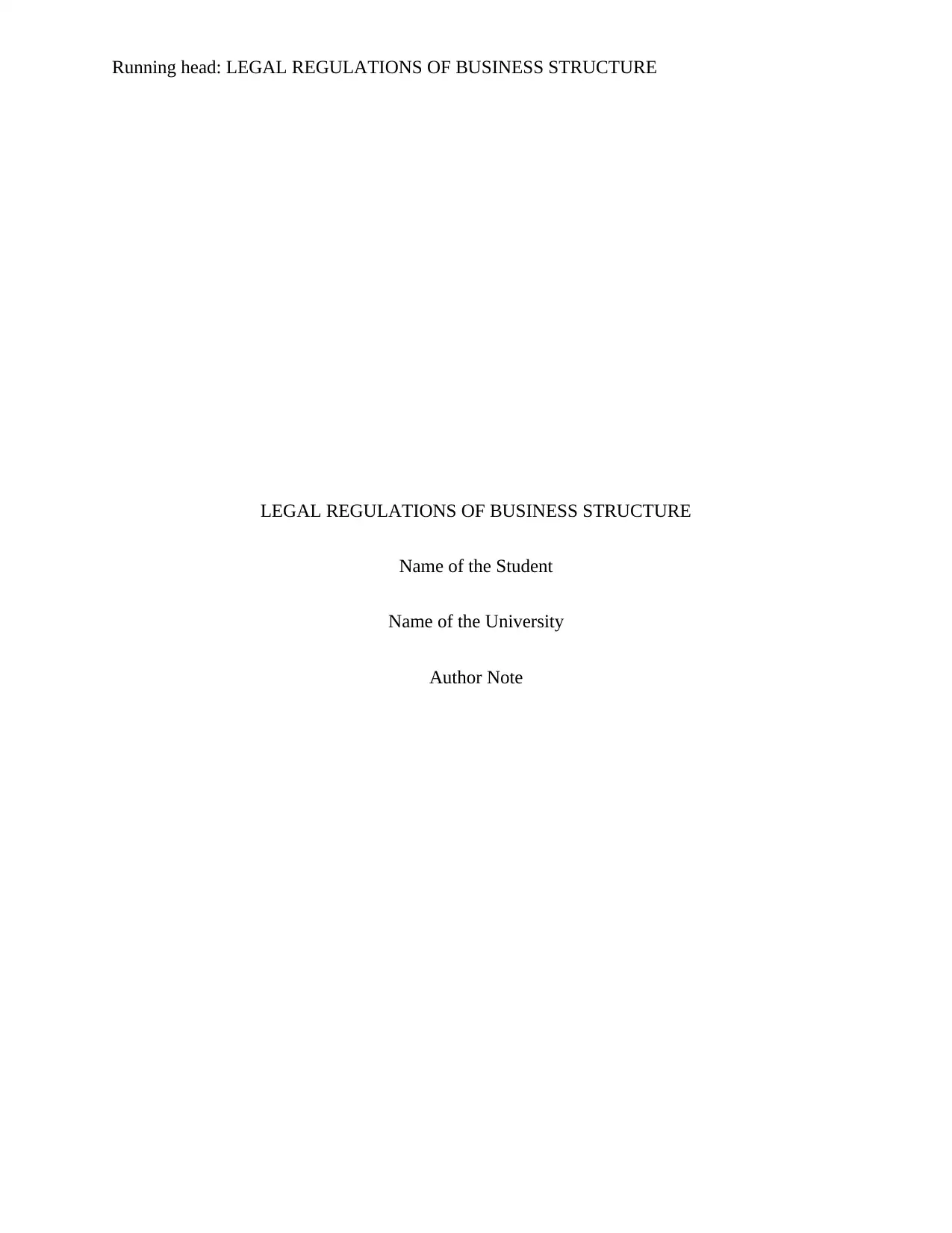
Running head: LEGAL REGULATIONS OF BUSINESS STRUCTURE
LEGAL REGULATIONS OF BUSINESS STRUCTURE
Name of the Student
Name of the University
Author Note
LEGAL REGULATIONS OF BUSINESS STRUCTURE
Name of the Student
Name of the University
Author Note
Paraphrase This Document
Need a fresh take? Get an instant paraphrase of this document with our AI Paraphraser
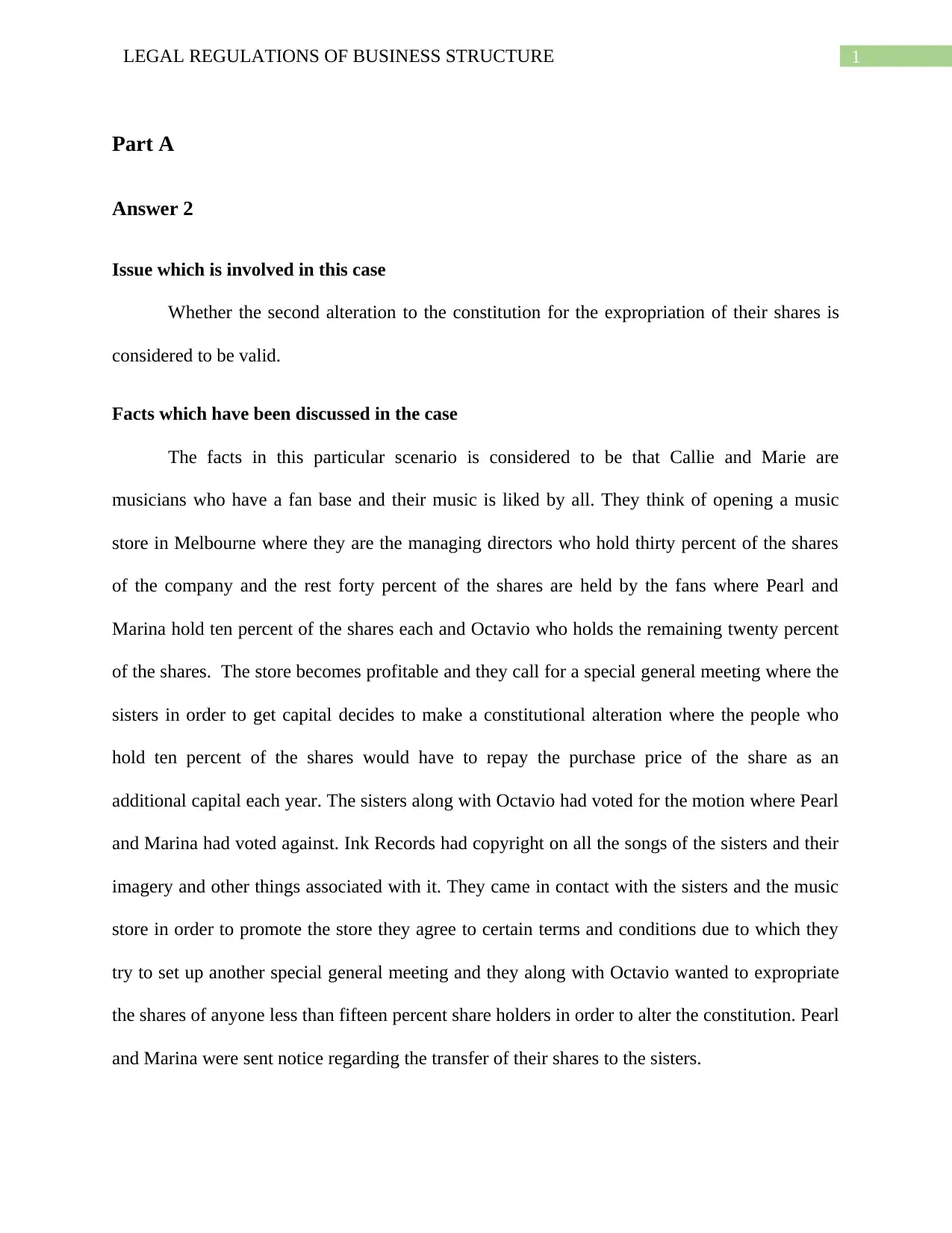
1LEGAL REGULATIONS OF BUSINESS STRUCTURE
Part A
Answer 2
Issue which is involved in this case
Whether the second alteration to the constitution for the expropriation of their shares is
considered to be valid.
Facts which have been discussed in the case
The facts in this particular scenario is considered to be that Callie and Marie are
musicians who have a fan base and their music is liked by all. They think of opening a music
store in Melbourne where they are the managing directors who hold thirty percent of the shares
of the company and the rest forty percent of the shares are held by the fans where Pearl and
Marina hold ten percent of the shares each and Octavio who holds the remaining twenty percent
of the shares. The store becomes profitable and they call for a special general meeting where the
sisters in order to get capital decides to make a constitutional alteration where the people who
hold ten percent of the shares would have to repay the purchase price of the share as an
additional capital each year. The sisters along with Octavio had voted for the motion where Pearl
and Marina had voted against. Ink Records had copyright on all the songs of the sisters and their
imagery and other things associated with it. They came in contact with the sisters and the music
store in order to promote the store they agree to certain terms and conditions due to which they
try to set up another special general meeting and they along with Octavio wanted to expropriate
the shares of anyone less than fifteen percent share holders in order to alter the constitution. Pearl
and Marina were sent notice regarding the transfer of their shares to the sisters.
Part A
Answer 2
Issue which is involved in this case
Whether the second alteration to the constitution for the expropriation of their shares is
considered to be valid.
Facts which have been discussed in the case
The facts in this particular scenario is considered to be that Callie and Marie are
musicians who have a fan base and their music is liked by all. They think of opening a music
store in Melbourne where they are the managing directors who hold thirty percent of the shares
of the company and the rest forty percent of the shares are held by the fans where Pearl and
Marina hold ten percent of the shares each and Octavio who holds the remaining twenty percent
of the shares. The store becomes profitable and they call for a special general meeting where the
sisters in order to get capital decides to make a constitutional alteration where the people who
hold ten percent of the shares would have to repay the purchase price of the share as an
additional capital each year. The sisters along with Octavio had voted for the motion where Pearl
and Marina had voted against. Ink Records had copyright on all the songs of the sisters and their
imagery and other things associated with it. They came in contact with the sisters and the music
store in order to promote the store they agree to certain terms and conditions due to which they
try to set up another special general meeting and they along with Octavio wanted to expropriate
the shares of anyone less than fifteen percent share holders in order to alter the constitution. Pearl
and Marina were sent notice regarding the transfer of their shares to the sisters.
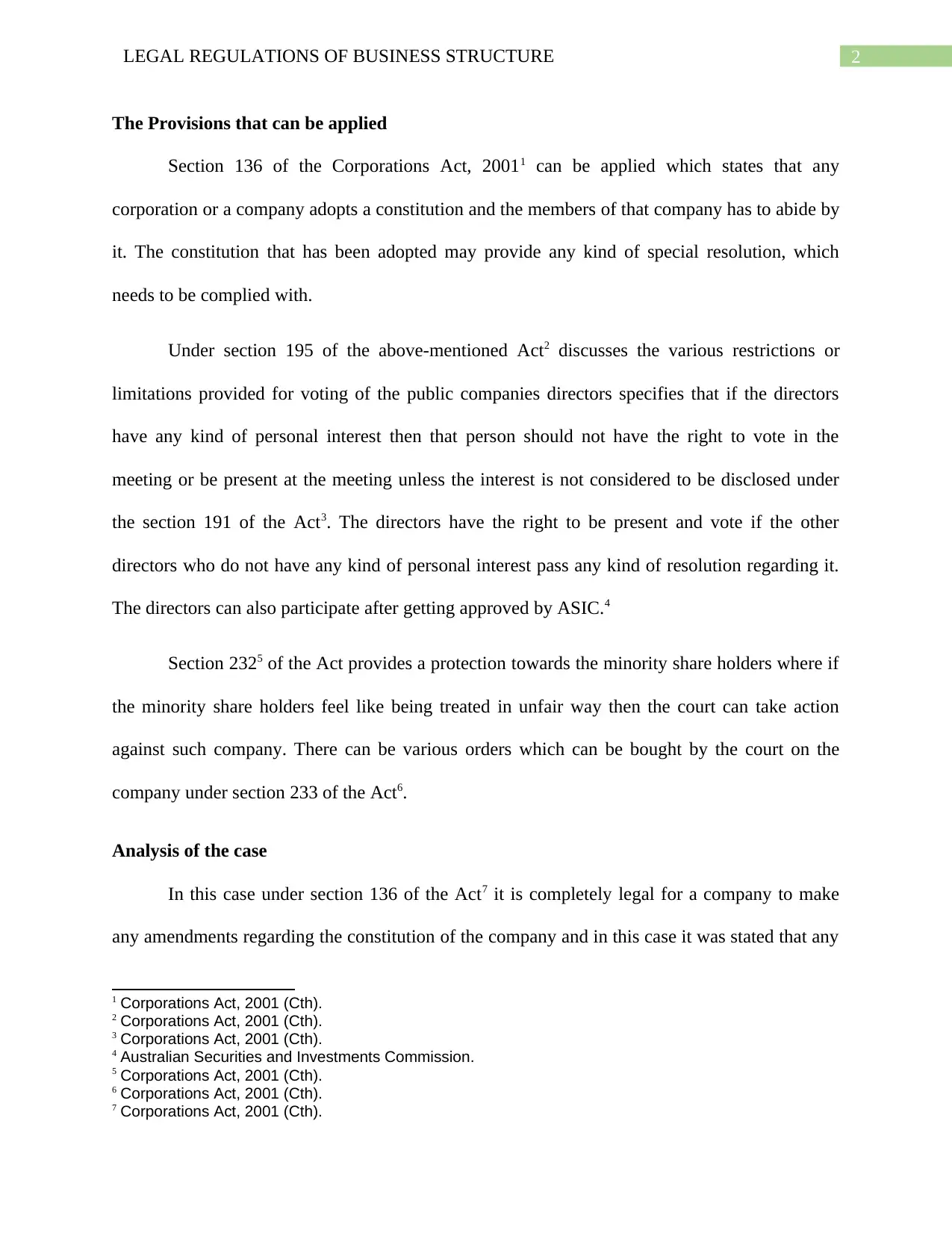
2LEGAL REGULATIONS OF BUSINESS STRUCTURE
The Provisions that can be applied
Section 136 of the Corporations Act, 20011 can be applied which states that any
corporation or a company adopts a constitution and the members of that company has to abide by
it. The constitution that has been adopted may provide any kind of special resolution, which
needs to be complied with.
Under section 195 of the above-mentioned Act2 discusses the various restrictions or
limitations provided for voting of the public companies directors specifies that if the directors
have any kind of personal interest then that person should not have the right to vote in the
meeting or be present at the meeting unless the interest is not considered to be disclosed under
the section 191 of the Act3. The directors have the right to be present and vote if the other
directors who do not have any kind of personal interest pass any kind of resolution regarding it.
The directors can also participate after getting approved by ASIC.4
Section 2325 of the Act provides a protection towards the minority share holders where if
the minority share holders feel like being treated in unfair way then the court can take action
against such company. There can be various orders which can be bought by the court on the
company under section 233 of the Act6.
Analysis of the case
In this case under section 136 of the Act7 it is completely legal for a company to make
any amendments regarding the constitution of the company and in this case it was stated that any
1 Corporations Act, 2001 (Cth).
2 Corporations Act, 2001 (Cth).
3 Corporations Act, 2001 (Cth).
4 Australian Securities and Investments Commission.
5 Corporations Act, 2001 (Cth).
6 Corporations Act, 2001 (Cth).
7 Corporations Act, 2001 (Cth).
The Provisions that can be applied
Section 136 of the Corporations Act, 20011 can be applied which states that any
corporation or a company adopts a constitution and the members of that company has to abide by
it. The constitution that has been adopted may provide any kind of special resolution, which
needs to be complied with.
Under section 195 of the above-mentioned Act2 discusses the various restrictions or
limitations provided for voting of the public companies directors specifies that if the directors
have any kind of personal interest then that person should not have the right to vote in the
meeting or be present at the meeting unless the interest is not considered to be disclosed under
the section 191 of the Act3. The directors have the right to be present and vote if the other
directors who do not have any kind of personal interest pass any kind of resolution regarding it.
The directors can also participate after getting approved by ASIC.4
Section 2325 of the Act provides a protection towards the minority share holders where if
the minority share holders feel like being treated in unfair way then the court can take action
against such company. There can be various orders which can be bought by the court on the
company under section 233 of the Act6.
Analysis of the case
In this case under section 136 of the Act7 it is completely legal for a company to make
any amendments regarding the constitution of the company and in this case it was stated that any
1 Corporations Act, 2001 (Cth).
2 Corporations Act, 2001 (Cth).
3 Corporations Act, 2001 (Cth).
4 Australian Securities and Investments Commission.
5 Corporations Act, 2001 (Cth).
6 Corporations Act, 2001 (Cth).
7 Corporations Act, 2001 (Cth).
⊘ This is a preview!⊘
Do you want full access?
Subscribe today to unlock all pages.

Trusted by 1+ million students worldwide
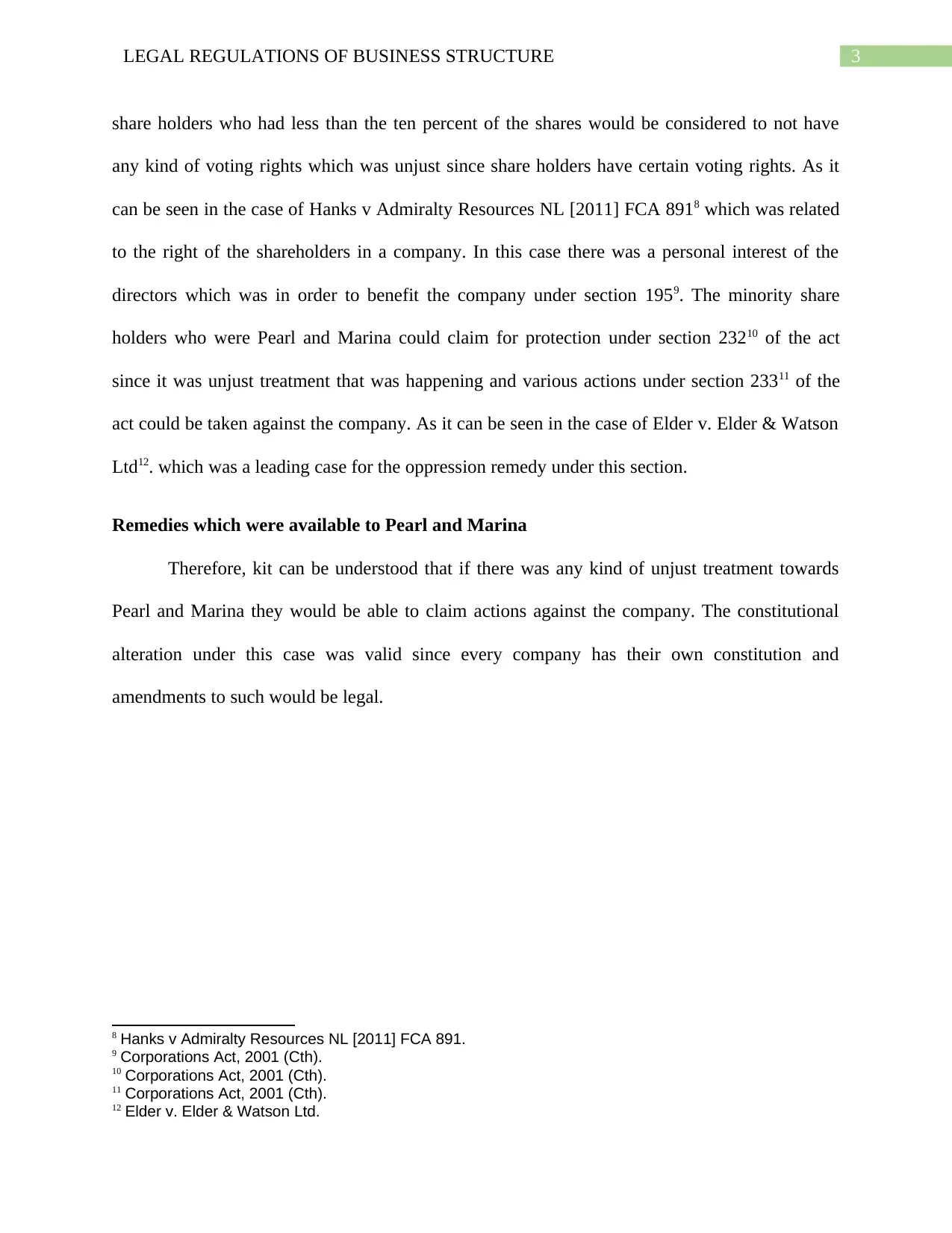
3LEGAL REGULATIONS OF BUSINESS STRUCTURE
share holders who had less than the ten percent of the shares would be considered to not have
any kind of voting rights which was unjust since share holders have certain voting rights. As it
can be seen in the case of Hanks v Admiralty Resources NL [2011] FCA 8918 which was related
to the right of the shareholders in a company. In this case there was a personal interest of the
directors which was in order to benefit the company under section 1959. The minority share
holders who were Pearl and Marina could claim for protection under section 23210 of the act
since it was unjust treatment that was happening and various actions under section 23311 of the
act could be taken against the company. As it can be seen in the case of Elder v. Elder & Watson
Ltd12. which was a leading case for the oppression remedy under this section.
Remedies which were available to Pearl and Marina
Therefore, kit can be understood that if there was any kind of unjust treatment towards
Pearl and Marina they would be able to claim actions against the company. The constitutional
alteration under this case was valid since every company has their own constitution and
amendments to such would be legal.
8 Hanks v Admiralty Resources NL [2011] FCA 891.
9 Corporations Act, 2001 (Cth).
10 Corporations Act, 2001 (Cth).
11 Corporations Act, 2001 (Cth).
12 Elder v. Elder & Watson Ltd.
share holders who had less than the ten percent of the shares would be considered to not have
any kind of voting rights which was unjust since share holders have certain voting rights. As it
can be seen in the case of Hanks v Admiralty Resources NL [2011] FCA 8918 which was related
to the right of the shareholders in a company. In this case there was a personal interest of the
directors which was in order to benefit the company under section 1959. The minority share
holders who were Pearl and Marina could claim for protection under section 23210 of the act
since it was unjust treatment that was happening and various actions under section 23311 of the
act could be taken against the company. As it can be seen in the case of Elder v. Elder & Watson
Ltd12. which was a leading case for the oppression remedy under this section.
Remedies which were available to Pearl and Marina
Therefore, kit can be understood that if there was any kind of unjust treatment towards
Pearl and Marina they would be able to claim actions against the company. The constitutional
alteration under this case was valid since every company has their own constitution and
amendments to such would be legal.
8 Hanks v Admiralty Resources NL [2011] FCA 891.
9 Corporations Act, 2001 (Cth).
10 Corporations Act, 2001 (Cth).
11 Corporations Act, 2001 (Cth).
12 Elder v. Elder & Watson Ltd.
Paraphrase This Document
Need a fresh take? Get an instant paraphrase of this document with our AI Paraphraser
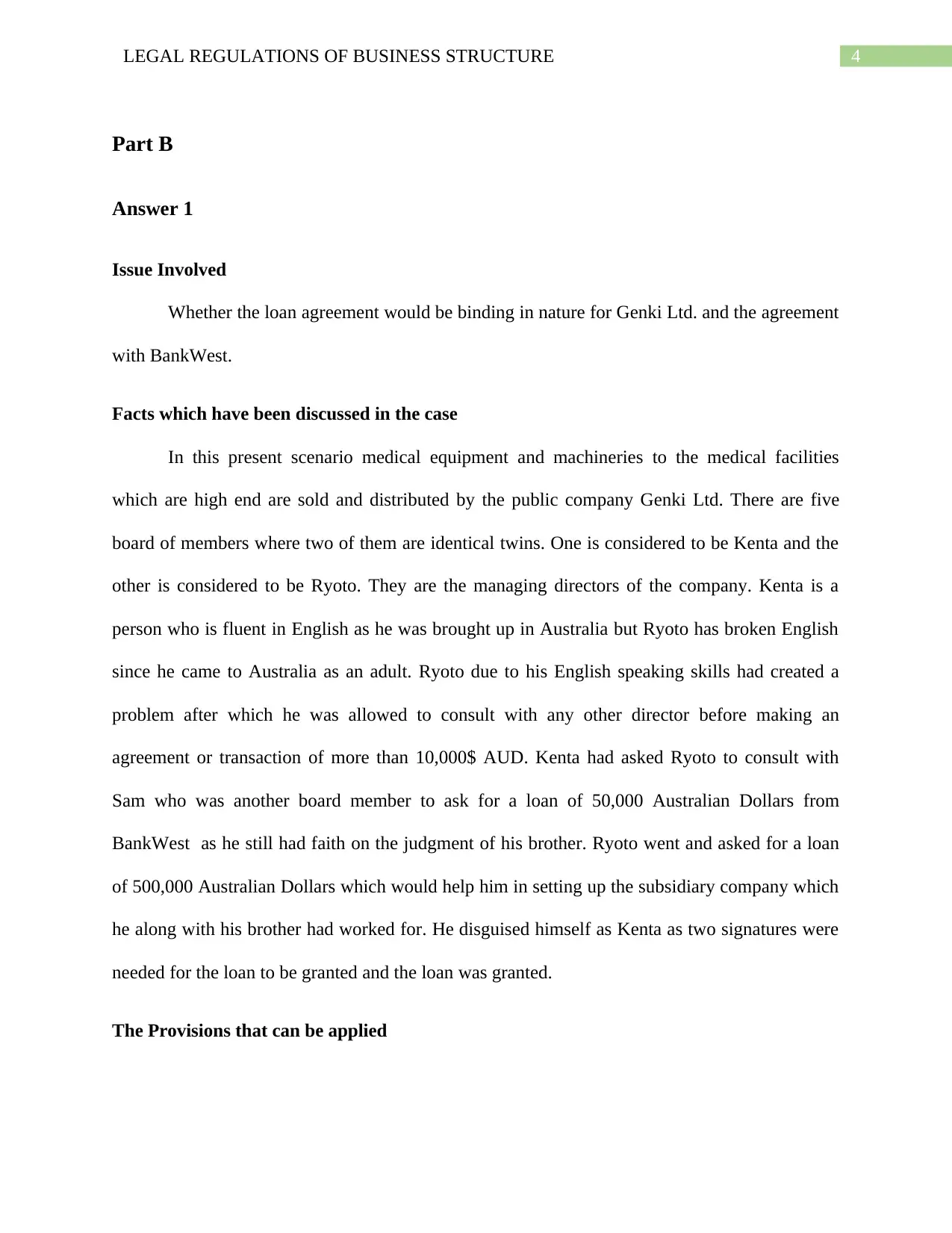
4LEGAL REGULATIONS OF BUSINESS STRUCTURE
Part B
Answer 1
Issue Involved
Whether the loan agreement would be binding in nature for Genki Ltd. and the agreement
with BankWest.
Facts which have been discussed in the case
In this present scenario medical equipment and machineries to the medical facilities
which are high end are sold and distributed by the public company Genki Ltd. There are five
board of members where two of them are identical twins. One is considered to be Kenta and the
other is considered to be Ryoto. They are the managing directors of the company. Kenta is a
person who is fluent in English as he was brought up in Australia but Ryoto has broken English
since he came to Australia as an adult. Ryoto due to his English speaking skills had created a
problem after which he was allowed to consult with any other director before making an
agreement or transaction of more than 10,000$ AUD. Kenta had asked Ryoto to consult with
Sam who was another board member to ask for a loan of 50,000 Australian Dollars from
BankWest as he still had faith on the judgment of his brother. Ryoto went and asked for a loan
of 500,000 Australian Dollars which would help him in setting up the subsidiary company which
he along with his brother had worked for. He disguised himself as Kenta as two signatures were
needed for the loan to be granted and the loan was granted.
The Provisions that can be applied
Part B
Answer 1
Issue Involved
Whether the loan agreement would be binding in nature for Genki Ltd. and the agreement
with BankWest.
Facts which have been discussed in the case
In this present scenario medical equipment and machineries to the medical facilities
which are high end are sold and distributed by the public company Genki Ltd. There are five
board of members where two of them are identical twins. One is considered to be Kenta and the
other is considered to be Ryoto. They are the managing directors of the company. Kenta is a
person who is fluent in English as he was brought up in Australia but Ryoto has broken English
since he came to Australia as an adult. Ryoto due to his English speaking skills had created a
problem after which he was allowed to consult with any other director before making an
agreement or transaction of more than 10,000$ AUD. Kenta had asked Ryoto to consult with
Sam who was another board member to ask for a loan of 50,000 Australian Dollars from
BankWest as he still had faith on the judgment of his brother. Ryoto went and asked for a loan
of 500,000 Australian Dollars which would help him in setting up the subsidiary company which
he along with his brother had worked for. He disguised himself as Kenta as two signatures were
needed for the loan to be granted and the loan was granted.
The Provisions that can be applied
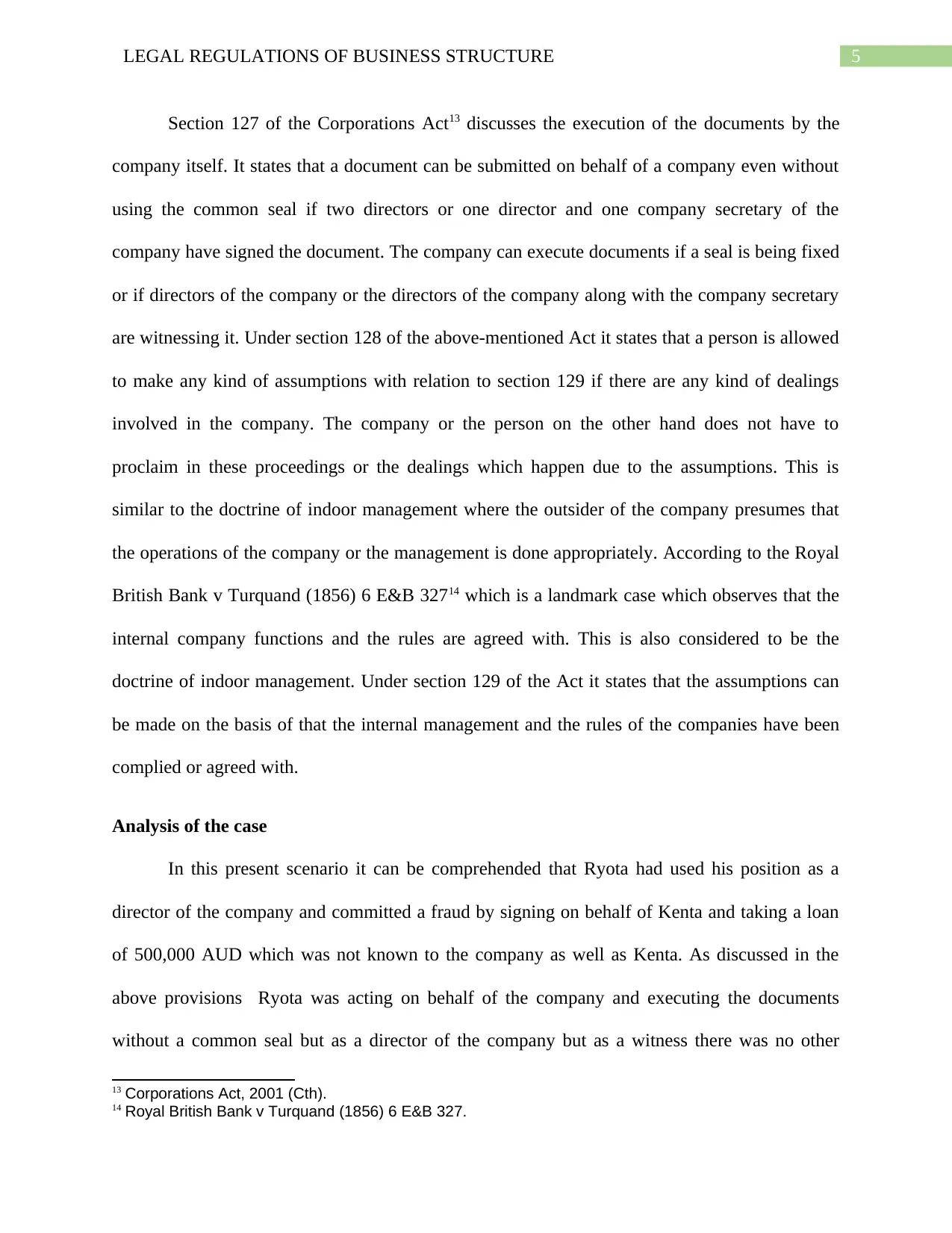
5LEGAL REGULATIONS OF BUSINESS STRUCTURE
Section 127 of the Corporations Act13 discusses the execution of the documents by the
company itself. It states that a document can be submitted on behalf of a company even without
using the common seal if two directors or one director and one company secretary of the
company have signed the document. The company can execute documents if a seal is being fixed
or if directors of the company or the directors of the company along with the company secretary
are witnessing it. Under section 128 of the above-mentioned Act it states that a person is allowed
to make any kind of assumptions with relation to section 129 if there are any kind of dealings
involved in the company. The company or the person on the other hand does not have to
proclaim in these proceedings or the dealings which happen due to the assumptions. This is
similar to the doctrine of indoor management where the outsider of the company presumes that
the operations of the company or the management is done appropriately. According to the Royal
British Bank v Turquand (1856) 6 E&B 32714 which is a landmark case which observes that the
internal company functions and the rules are agreed with. This is also considered to be the
doctrine of indoor management. Under section 129 of the Act it states that the assumptions can
be made on the basis of that the internal management and the rules of the companies have been
complied or agreed with.
Analysis of the case
In this present scenario it can be comprehended that Ryota had used his position as a
director of the company and committed a fraud by signing on behalf of Kenta and taking a loan
of 500,000 AUD which was not known to the company as well as Kenta. As discussed in the
above provisions Ryota was acting on behalf of the company and executing the documents
without a common seal but as a director of the company but as a witness there was no other
13 Corporations Act, 2001 (Cth).
14 Royal British Bank v Turquand (1856) 6 E&B 327.
Section 127 of the Corporations Act13 discusses the execution of the documents by the
company itself. It states that a document can be submitted on behalf of a company even without
using the common seal if two directors or one director and one company secretary of the
company have signed the document. The company can execute documents if a seal is being fixed
or if directors of the company or the directors of the company along with the company secretary
are witnessing it. Under section 128 of the above-mentioned Act it states that a person is allowed
to make any kind of assumptions with relation to section 129 if there are any kind of dealings
involved in the company. The company or the person on the other hand does not have to
proclaim in these proceedings or the dealings which happen due to the assumptions. This is
similar to the doctrine of indoor management where the outsider of the company presumes that
the operations of the company or the management is done appropriately. According to the Royal
British Bank v Turquand (1856) 6 E&B 32714 which is a landmark case which observes that the
internal company functions and the rules are agreed with. This is also considered to be the
doctrine of indoor management. Under section 129 of the Act it states that the assumptions can
be made on the basis of that the internal management and the rules of the companies have been
complied or agreed with.
Analysis of the case
In this present scenario it can be comprehended that Ryota had used his position as a
director of the company and committed a fraud by signing on behalf of Kenta and taking a loan
of 500,000 AUD which was not known to the company as well as Kenta. As discussed in the
above provisions Ryota was acting on behalf of the company and executing the documents
without a common seal but as a director of the company but as a witness there was no other
13 Corporations Act, 2001 (Cth).
14 Royal British Bank v Turquand (1856) 6 E&B 327.
⊘ This is a preview!⊘
Do you want full access?
Subscribe today to unlock all pages.

Trusted by 1+ million students worldwide
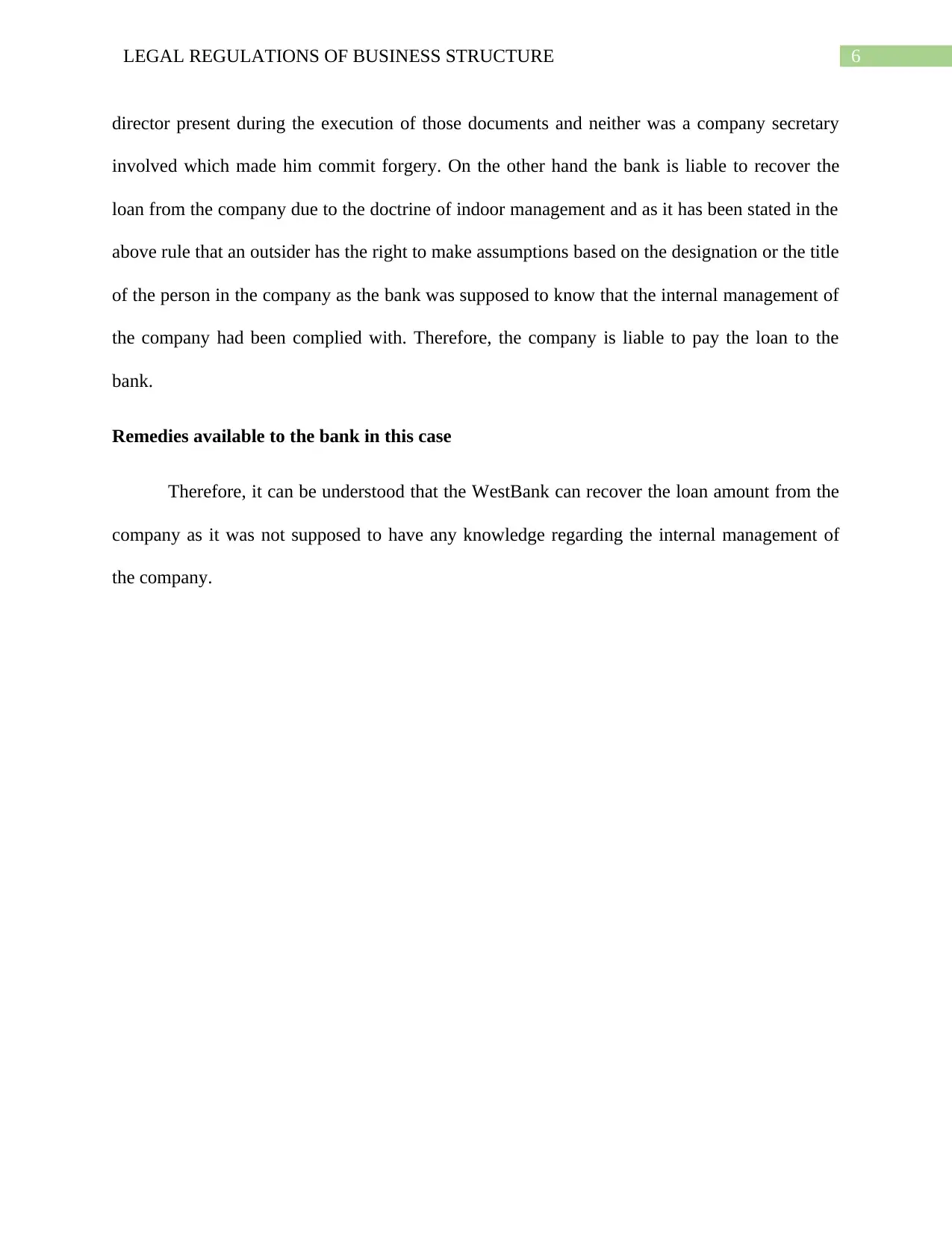
6LEGAL REGULATIONS OF BUSINESS STRUCTURE
director present during the execution of those documents and neither was a company secretary
involved which made him commit forgery. On the other hand the bank is liable to recover the
loan from the company due to the doctrine of indoor management and as it has been stated in the
above rule that an outsider has the right to make assumptions based on the designation or the title
of the person in the company as the bank was supposed to know that the internal management of
the company had been complied with. Therefore, the company is liable to pay the loan to the
bank.
Remedies available to the bank in this case
Therefore, it can be understood that the WestBank can recover the loan amount from the
company as it was not supposed to have any knowledge regarding the internal management of
the company.
director present during the execution of those documents and neither was a company secretary
involved which made him commit forgery. On the other hand the bank is liable to recover the
loan from the company due to the doctrine of indoor management and as it has been stated in the
above rule that an outsider has the right to make assumptions based on the designation or the title
of the person in the company as the bank was supposed to know that the internal management of
the company had been complied with. Therefore, the company is liable to pay the loan to the
bank.
Remedies available to the bank in this case
Therefore, it can be understood that the WestBank can recover the loan amount from the
company as it was not supposed to have any knowledge regarding the internal management of
the company.
Paraphrase This Document
Need a fresh take? Get an instant paraphrase of this document with our AI Paraphraser
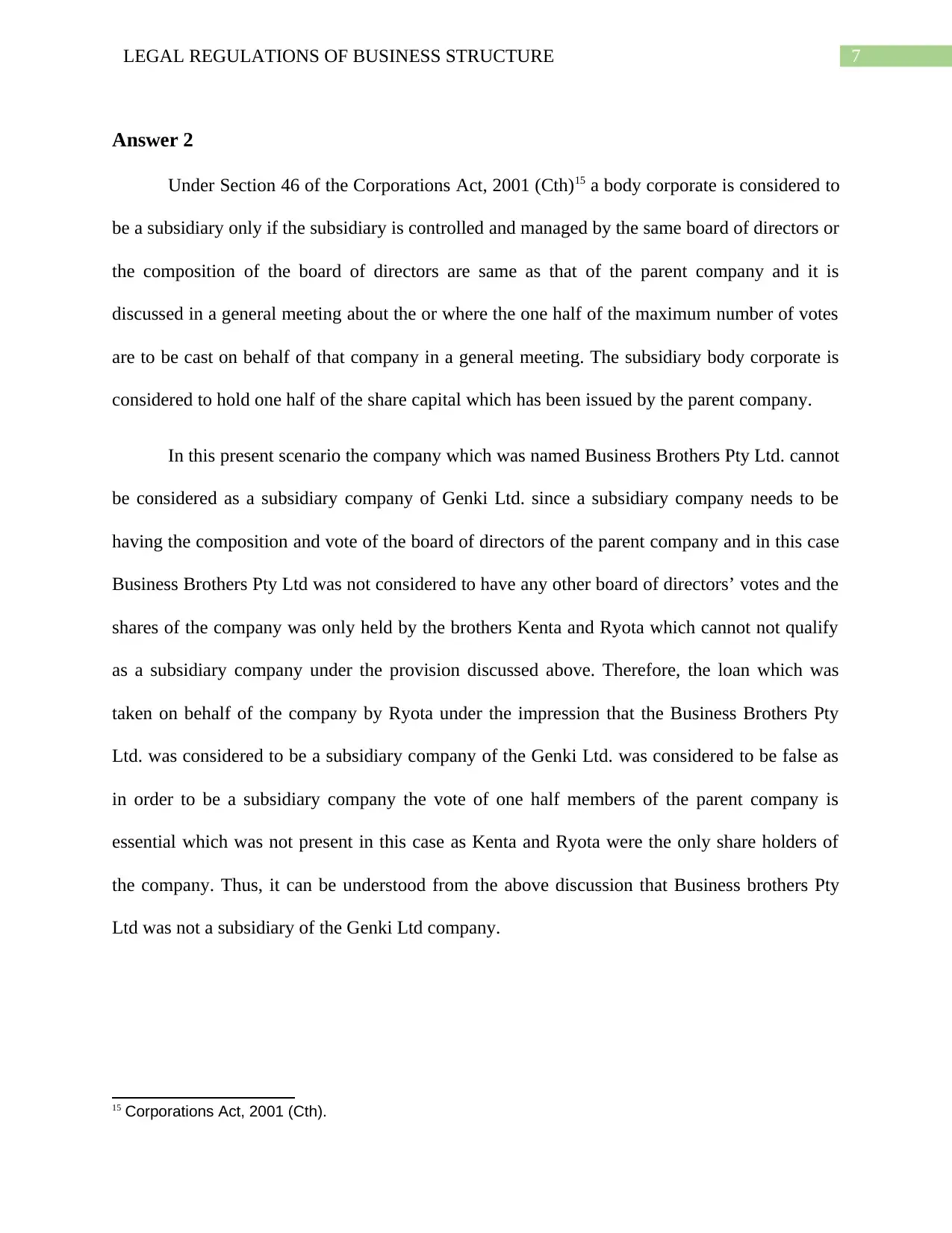
7LEGAL REGULATIONS OF BUSINESS STRUCTURE
Answer 2
Under Section 46 of the Corporations Act, 2001 (Cth)15 a body corporate is considered to
be a subsidiary only if the subsidiary is controlled and managed by the same board of directors or
the composition of the board of directors are same as that of the parent company and it is
discussed in a general meeting about the or where the one half of the maximum number of votes
are to be cast on behalf of that company in a general meeting. The subsidiary body corporate is
considered to hold one half of the share capital which has been issued by the parent company.
In this present scenario the company which was named Business Brothers Pty Ltd. cannot
be considered as a subsidiary company of Genki Ltd. since a subsidiary company needs to be
having the composition and vote of the board of directors of the parent company and in this case
Business Brothers Pty Ltd was not considered to have any other board of directors’ votes and the
shares of the company was only held by the brothers Kenta and Ryota which cannot not qualify
as a subsidiary company under the provision discussed above. Therefore, the loan which was
taken on behalf of the company by Ryota under the impression that the Business Brothers Pty
Ltd. was considered to be a subsidiary company of the Genki Ltd. was considered to be false as
in order to be a subsidiary company the vote of one half members of the parent company is
essential which was not present in this case as Kenta and Ryota were the only share holders of
the company. Thus, it can be understood from the above discussion that Business brothers Pty
Ltd was not a subsidiary of the Genki Ltd company.
15 Corporations Act, 2001 (Cth).
Answer 2
Under Section 46 of the Corporations Act, 2001 (Cth)15 a body corporate is considered to
be a subsidiary only if the subsidiary is controlled and managed by the same board of directors or
the composition of the board of directors are same as that of the parent company and it is
discussed in a general meeting about the or where the one half of the maximum number of votes
are to be cast on behalf of that company in a general meeting. The subsidiary body corporate is
considered to hold one half of the share capital which has been issued by the parent company.
In this present scenario the company which was named Business Brothers Pty Ltd. cannot
be considered as a subsidiary company of Genki Ltd. since a subsidiary company needs to be
having the composition and vote of the board of directors of the parent company and in this case
Business Brothers Pty Ltd was not considered to have any other board of directors’ votes and the
shares of the company was only held by the brothers Kenta and Ryota which cannot not qualify
as a subsidiary company under the provision discussed above. Therefore, the loan which was
taken on behalf of the company by Ryota under the impression that the Business Brothers Pty
Ltd. was considered to be a subsidiary company of the Genki Ltd. was considered to be false as
in order to be a subsidiary company the vote of one half members of the parent company is
essential which was not present in this case as Kenta and Ryota were the only share holders of
the company. Thus, it can be understood from the above discussion that Business brothers Pty
Ltd was not a subsidiary of the Genki Ltd company.
15 Corporations Act, 2001 (Cth).
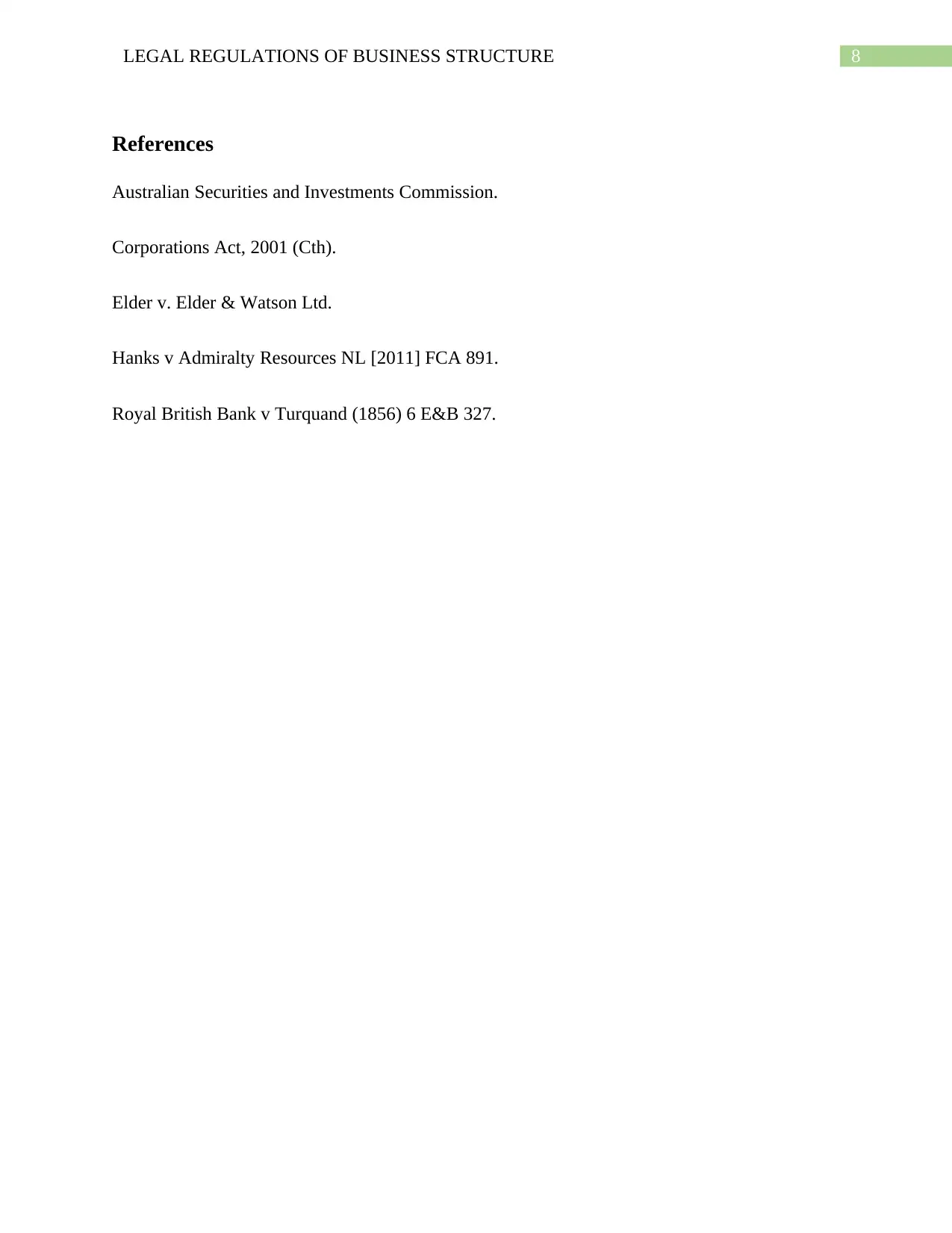
8LEGAL REGULATIONS OF BUSINESS STRUCTURE
References
Australian Securities and Investments Commission.
Corporations Act, 2001 (Cth).
Elder v. Elder & Watson Ltd.
Hanks v Admiralty Resources NL [2011] FCA 891.
Royal British Bank v Turquand (1856) 6 E&B 327.
References
Australian Securities and Investments Commission.
Corporations Act, 2001 (Cth).
Elder v. Elder & Watson Ltd.
Hanks v Admiralty Resources NL [2011] FCA 891.
Royal British Bank v Turquand (1856) 6 E&B 327.
⊘ This is a preview!⊘
Do you want full access?
Subscribe today to unlock all pages.

Trusted by 1+ million students worldwide
1 out of 9
Related Documents
Your All-in-One AI-Powered Toolkit for Academic Success.
+13062052269
info@desklib.com
Available 24*7 on WhatsApp / Email
![[object Object]](/_next/static/media/star-bottom.7253800d.svg)
Unlock your academic potential
Copyright © 2020–2026 A2Z Services. All Rights Reserved. Developed and managed by ZUCOL.





